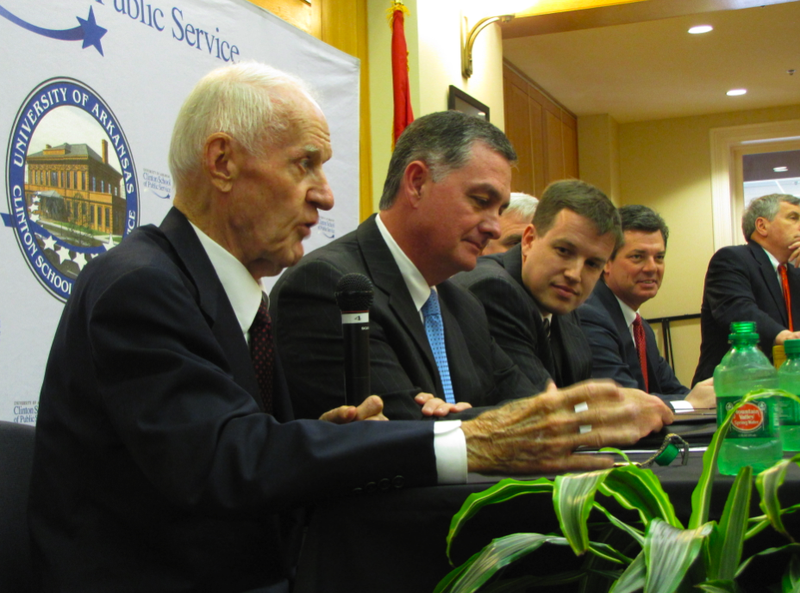LITTLE ROCK — Speaking at a discussion on devastating floods across Arkansas in recent weeks, Clinton School of Public Service Dean Skip Rutherford reminded panelists and guests of the havoc wreaked by The Great Mississippi Flood of 1927.
That historic disaster damaged 200 bridges and more than 1,000 miles of roadway in Arkansas alone.
So how do the recent floodwaters compare? Randy Ort, a spokesman for the Arkansas Department of Highways and Transportation, summed it up in a single word: "Worse."
Ort was one of five panelists at the lunchtime discussion at the Clinton School's Sturgis Hall, talking to a crowd of more than 75 people about the affects - immediate and ongoing - of the deadly floodwaters.
Galleries & Videos:
Recent flood stories & info:
Joining Ort on the panel were Henry Hemstedt, the chief of Hydrology with the Little Rock District of the Army Corps of Engineers; Matt DeCample, a spokesman for Gov. Mike Beebe; Warren Carter, director of regulatory affairs for the Arkansas Farm Bureau; and William H. Bowen, the namesake of the UALR Bowen School of Law who recounted his family being displaced by the 1927 flood when he was just 3 years old.
Ort, expounding on his one-word summation of the flood problems, called the affects of the 2011 flooding "unprecedented," noting that Interstate 40 had never had to close previously because of high water. This year, the White River swelled in Prairie County, necessitating a roundabout detour that had some commercial vehicles going 300 miles out of their way.
"So we weren't real popular there for awhile," Ort said, noting statewide road closures surged from three on April 24 to more than 80 by May 3. He estimated the total damage to Arkansas roadways would be "in the tens of millions of dollars," but said it's too early to know because some water still hasn't receded.
Carter said total cost to Arkansas' farmers is estimated at $500 million before any infrastructure or equipment losses is considered. And even then, he described the figure as "very conservative."
"We feel like there's a lot we don't know," he said. Some farmers will likely be devastated financially, while others will be able to work through it and "hope for a better year next year."
Hemstedt said the damage could have been much worse, if not for the system of dams, levees and flood-storing lakes implemented since floods in 1927 and 1937. Without them, Newport, Jacksonport and large swaths of land around the White River that were spared in recent weeks would have been underwater.
"That water would have just spread out," Hemstedt said.
DeCample said Arkansas since April 24 has "pretty well been in a constant state of emergency" because of floods or tornadoes. The response has been aided, he said, by improved performance from the Federal Emergency Management Agency, which Beebe criticized for its slow response after a 2007 tornado in Dumas.
DeCample - who acknowledged the total statewide damage could eclipse $1 billion - said the state will continue to prepare for disasters while hoping its seen its share of them for some time.
"All you can do is prepare and hope it's not our turn anymore," he said.
